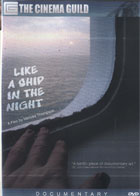
Like a Ship in the Night 2007
Distributed by Cinema Guild, 115 West 30th Street, Suite 800, New York, NY 10001; 212-685-6242
Producer n/a
Directed by Melissa Thompson
DVD, color, 30 min.
Adult
European Studies, Gender Studies, Human Rights, Sociology, Women's Studies
Date Entered: 07/31/2008
Reviewed by Linda Frederiksen, Washington State University, Vancouver, WAThe complex story of reproductive rights is the topic of this succinct, straight forward documentary film. Prohibited by constitutional law since 1861, abortion is an illegal act throughout Ireland. Although modified somewhat by several referenda in the 1990’s Irish policy and attitude towards abortion remains among the most Draconian in Europe today. As a result of the law, and despite what appears to be popular interest in a more moderate approach, approximately 8000 Irish women per year travel outside their country’s borders to terminate a pregnancy. Conveyed in journalistic interview style, the film includes comments by Irish and British social workers, doctors and counselors who provide background and context to the issue. The anguishing personal stories of three faceless Irish women who made the difficult, lonely, and expensive journey to Britain to end their own pregnancies are also told.
A 93-minute bonus disc accompanies the film, featuring lengthier interviews with most of the key contributors who present more information on both the past and the present situation. The five short documentaries included on the bonus disc are organized by topic and are titled: Historical Undercurrents; Making Waves: Pro-Choice Groups in Ireland; Crossing Over: Logistics of Travel; Escorting Irish Women; and Stuck at Sea: The Current Situation.
By no means neutral, the film clearly advocates pro-choice as a woman’s reproductive and human right and portrays Irish law in this area to be both rigidly conservative and ultimately anti-female. Despite its very volatile subject, the film is neither a polemic nor an emotional outcry. It is recommended for general adult audiences who understand and accept the partiality.